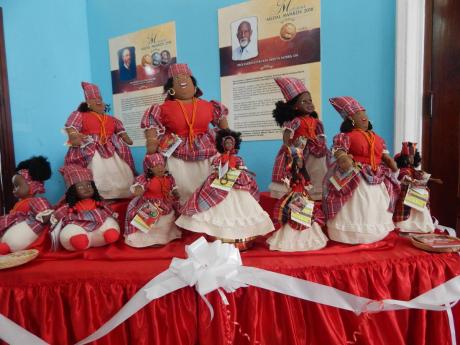Miss Lou a pioneer in Jamaican popular music
Cultural icon Louise ‘Miss Lou’ Bennett-Coverley not only had a great influence on many of Jamaican popular musicians, but was the first singer in the island to produce commercial recordings. She started in 1950, Jamaica Music Museum director/curator Herbie Miller revealed to an audience at the Institute of Jamaica (IOJ) on October 2.
Speaking about Miss Lou’s influence on Jamaican popular music, Miller said that in 1950 the multi-talented singer, poet, actress and essayist recorded, on two discs, Bongo Man, Linstead Market, Cordelia Brown, Mattie Rag, Hog Inna mi Coco and Dis Long Time Gal. These were followed by two LPs (long-playing records), Jamaican Folk Songs (1954) on the Folkways label, and Children’s Jamaican Songs (1957).
MAJOR INFLUENCES
Miller said that our major musicians, including Burning Spear, Pablo Moses, Peter Tosh, Agustus Pablo, Don Drummond, The Skatalites as well as Bob Marley and the Wailers, were the ones most influenced by Miss Lou.
“The greatest contribution our music has made to the world,” he declared, “is not the American ‘Oh, Oh, Oh, I love you’ type of songs but the ones that say ‘Come wi go chant down Babylon one more time,’ the ones against apartheid, the ones about Garvey. Those make our greatest contribution, by attacking [the ills of] the system on behalf of the common folk.”
Pointing out that people of different backgrounds in various countries and ethnicities have been able to use our music in their own struggles, he added that Miss Lou, too, was militant. But though her work came under attack, she cleverly wrapped her militancy in humour, song and dance, and so was able to gain acceptance from those who might have opposed her.
Said Miller: “She had them dancing to them own calamity.”
He continued: “She artfully, in a non-threatening way, created a vision in young people so they were able to acknowledge who they were – children of Africa. The only other people who were able to do that in a mass way were Rastafari.”
Miller said that Bennett-Coverley’s acceptance of things indigenously Jamaican – like Rastafari (adherents were contemptuously called ‘beard men’ in the early days), the idiosyncratic cries of street sellers, the Jamaican language (which she considered as important as standard English), our proverbs and mento music – was empowering.
“She gave confidence to generations of artistes who would educate, uplift and teach fans and listeners to Jamaican popular music, which came under serious attack,” he continued.
At one time, a parliamentarian wanted mento music banned, and when ska came out it was considered by many to be “boogooyaggah” music. Miss Lou’s recordings helped to make mento popular and today, ska is popular internationally, said Miller.
UNITING PEOPLE
“Miss Lou gave confidence to us and we created what is today one of the most potent examples of contemporary world music – a music that tears down walls and unites people,” he said.
During his talk, Miller played recordings of Miss Lou reciting her poems, and songs by various musicians, including The Wailers, a mento band and Bob Marley. He also showed clips from a film showing Bennett-Coverley dancing with national hero-to-be, Norman Washington Manley.
After Miller, musician Frankie Campbell, of Fab 5 band, told the audience that the band worked with Miss Lou in 1968. Calling her and her fellow actor Ranny Williams Jamaica’s first superstars, Campbell said that when the band backed Miss Lou with some of her new and old songs, a little reggae and rocksteady were added. Miss Lou’s work remains relevant today and will remain pertinent in years to come, he said.
Following the talks in the IOJ auditorium, a number of school children went on the stage to recite some of Miss Lou’s poems.

